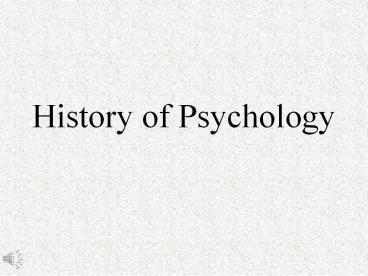History of Psychology - PowerPoint PPT Presentation
1 / 24
Title:
History of Psychology
Description:
History of Psychology Started as Philosophy Socrates & Plato Mind and Body are Separate Knowledge is inborn Aristotle Mind & Body are One Knowledge grows from ... – PowerPoint PPT presentation
Number of Views:217
Avg rating:3.0/5.0
Title: History of Psychology
1
History of Psychology
2
Started as Philosophy
- Socrates Plato
- Mind and Body are Separate
- Knowledge is inborn
- Aristotle
- Mind Body are One
- Knowledge grows from experiences memories
3
Philosophical Developments
- A Question How are mind and body
related?
BIG
- René Descartes (15961650) -Interactive Dualism
- The mind and body are separate but interact
(fluids through the nerves) to produce conscious
experience of sensations emotions
4
Heading Towards a Science
- Francis Bacon John Locke
- Both focus on how the mind is shaped by
experience
- Led to EMPIRICISM What we know comes from
experience, therefore science should rely on
observation experimentation.
5
Physiology Influence
- Study of functions parts of humans
- By 1600s began to focus on brain
- Began to develop explanations for the functioning
of the senses. - Becomes foundation for psychology as a science
6
Psychology as Science is Born!
Psychology The Science
December 1879
Wilhelm Wundt
7
What is Psychology?
- The science of behavior and mental processes
- Behavior - observable actions of a person or
animal - Mental Processes - feelings, sensations,
perceptions, memories, dreams, motives and other
subjective experiences - Science - an objective way to answer questions
based on observable facts/data and well-described
methods - Separated from philosophy in 19th century
- influences from physiology remain
8
- Wilhelm Wundt
- Leipzig, Germany
- The father of psychology
- Founder of modern psychology
- Opened the first psychology lab in 1879
- applied laboratory techniques to study of the
mind/consciousness - Wrote Principles of Physiological Psychology
connecting physiology to psychology
Whos Your Daddy?
Wilhelm Wundt (18321920)
9
E.B. Titchener
- Wundts student,
- Professor at Cornell University
- Analyzed the intensity, clarity and quality of
the parts of consciousness - Founder of structuralism
E. B. Titchener (18671927)
10
Structuralism
- Studied the basic elements (structures) of
thoughts and sensations (consciousness). - Felt consciousness could be broken into 3 parts
- physical sensations
- feelings
- images
- Introspection subject would view an object and
try to reconstruct their sensations feelings
they felt while viewing it. - Not scientific too subjective, not repeatable,
not able to be used for studying all topics
(learning, development, mental disorders).
11
William James
- First American psychologist
- Started psychology at Harvard in 1870s
- Opposed Wundt and Titcheners approach
- Author of the first psychology textbook
(Principles of Psychology - 1,400 pages!) - Founder of Functionalism
- functionalism influenced by Darwin to focus on
how behaviors help us adapt to the environment
William James (18421910)
12
Functionalism
- Emphasized studying the function of consciousness
and how consciousness helped people adapt to
their environment - Wanted to understand how mind and consciousness
worked - Used naturalistic observation
- Viewed consciousness as a stream of constantly
changing states .
13
DAILY
- DOUBLE
14
Explain the difference between Structuralism
Functionalism.
- Structuralism basic parts of a persons
thoughts and feelings. Focus on basic senses
perception. - Functionalism how our consciousness helps us to
function or adapt to our environment.
15
William James Students
- G. Stanley Hall
- First Ph.D. in psych
- Started first U.S. psych lab
- Started the American Psychological Association.
- Mary Whiton Calkins
- First woman to complete Ph.D. program but Harvard
didnt give her a degree! - Became first woman president of the APA in 1905
- Margaret Floy Washburn
- First official Ph.D. in psychology
- Studied different animal species
- 2nd female president of APA
16
John B. Watson
- Founder of Behaviorism
- Studied only observable and objectively described
acts - Emphasized objective and scientific methodology
- Performed the Little Albert Classical
Conditioning Study on Fear
John B. Watson (18781958)
17
B.F. Skinner
- Behaviorist
- American psychologist at Harvard
- Focused on learning through rewards and
observation - Studied learning and effect of reinforcement
punishment (Operant Conditioning)
B. F. Skinner (19041990)
18
Ivan Pavlov (1849-1936)
- Behaviorist
- Russian Physiologist
- Studied learning through associations (classical
conditioning) in dogs - Emphasized the study of observable behaviors
Santa?
19
Sigmund Freud (1856-1939)
- Austrian physician that focused on illness
- Founder of the psychoanalytic perspective
- Believed that abnormal behavior originated from
unconscious drives and conflicts that were
aggressive and sexual in nature.
20
Freuds Influence
- Influence on pop culture
- Freudian slips
- Anal-retentive
- Influence on psychology
- Psychodynamic theory
- Unconscious thoughts
- Significance of childhood experiences
21
Carl Rogers Abraham Maslow(1902-1987)
(1908-1970)
- Helped to create Humanistic Psychology
- Stressed the study of conscious experience and an
individuals free will to reach their potential - Healthy individuals strive to reach their
potential (self-actualized).
22
Wolfgang Kohler
- Created Gestalt Psychology
- The whole is different from the sum of its parts.
- Integrate pieces of information into meaningful
wholes.
Wolfgang Kohler (1865-1965)
23
What do you see?
- You See the whole picture first rather than the
individual dots that make it up. Gestalt
Psychology - Scene from Ferris Bueller (start at 105)
24
Cognitive Neuroscience
- Combines the biological and cognitive schools of
thought in psychology - Study of the Brain and how it works when we
perceive, think, remember and use language.































